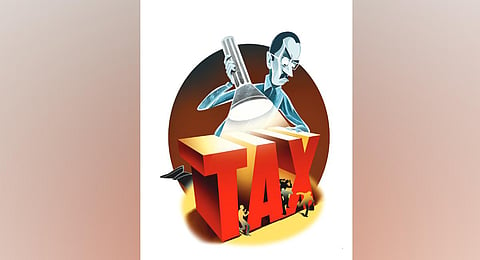

NEW DELHI: Meerut-based Manish Kumar (name changed) recently got a legal notice from the tax department as there was a huge gap between the income he showed in his income tax return (ITR) and what was shown in his bank statement.
While his bank statement showed an income of R13 lakh, he had disclosed only R5 lakh in the ITR, which was majorly his salary. This is not an isolated case; many people are getting tax notices for anomalies in their ITRs vis-à-vis bank accounts.
Tax experts say that if one is a salaried person and he/she deposits cash in one’s account, then proper records should be maintained as the assessing officer may question the source of income and levy a penalty. Other people may also transfer cash into the individual’s account, and if this amount exceeds R20,000, then this too should be accounted for while filing the tax return.
Keep documents ready
One should keep in mind that at the time of filing ITR, one does not need to submit any documentary evidence to substantiate the deduction claims or refund claims. An individual files an ITR on the basis of self-assessment but the income tax department has all the rights to ask the assessee to provide proof of the claims made in the ITR by issuing a legal notice.
According to experts, the time limit of seven years for keeping the documents from the end of the relevant financial year is applicable to all classes of individuals whether one is salaried person, self-employed or a professional. However, they say that it is always advisable to retain the documentary evidence for a longer period as the tax department can also ask for details of old cases up to 10 years in some exceptional cases.
In a bid to prevent people from claiming false refunds, the government is getting stricter and in future, it will get more vigilant to take such taxpayers to the task. A recent example is of Jammu and Kashmir, where more than 28,000 government employees got legal notices for claiming excessive and ineligible deductions under various heads. FIRs were registered against one chartered accountant (CA) and 404 other people for duping the tax department. These frauds related to FY18, FY19 and FY20 recently came to light after the tax deducted at source (TDS) wing of the department based in Srinagar found out the excessive claims.
“It is important for taxpayers to match their incomes as disclosed in the income tax returns (ITR) with the bank statements. In case there is a mismatch, then they may get income tax notice and will have to pay a penalty as per the income tax law, in case they fail to explain the discrepancy,” says CA Rohit Vishnoi, partner with RPMG and Associates.
According to the income tax law, if a person escapes from paying taxes or mis-declares his or her income, he or she can be prosecuted and charge-sheeted by the government under Section 276C of the IT Act involves rigorous imprisonment ranging from six months to seven years on a case-to-case basis.
“The taxpayers should duly consider Bank statements while filing ITR. If income is not properly offered to tax, the taxpayer will be required to pay the tax, with applicable interest. Penalties are also levied either of 50% of tax or 200% of tax depending on the type of tax evasion,” CA Chetan Daga, founder of AdvantEdge Consulting said.
According to tax experts, salaried employees must maintain proper books of accounts for the last eight years, so that they can avoid paying penalties on unexplained income. Though, it is to be noted that it is not mandatory for salaried employees to keep the accounts, as per the rules.
Maintaining a balance sheet
Experts say that those who are earning more than Rs 10 lakh a year, and are doing transactions for more than this amount, then, they should get a balance sheet made by an expert. The balance sheet is a statement of assets, liabilities and capital at a particular point in time. They should have the details of capital gains, deductions claimed and bank statements.
“These days many salaried employees are getting legal tax notices. Government is demanding documentary evidence of all the deductions claimed by assesses for previous assessment years,” Vishnoi said. According to Vishnoi, taxpayers in future will get more legal notices, as the government is getting stricter. “Many people deal in share trading also but they don’t keep the accounts and then they get
into all the legal hassles,” he added.
ITR filing: Be safe than sorry
Do not claim false refunds
In a bid to prevent people from claiming false refunds, the government is getting stricter and in future, it will get more vigilant to take such taxpayers to the task. A recent example is of Jammu and Kashmir, where more than 28,000 government employees got legal notices for claiming excessive and ineligible deductions under various heads.